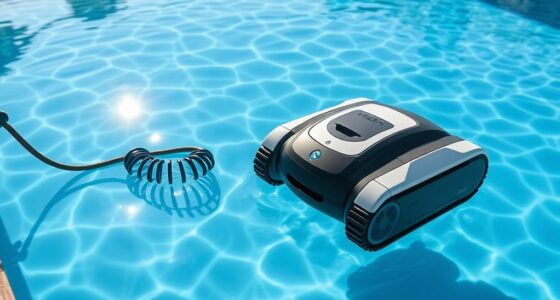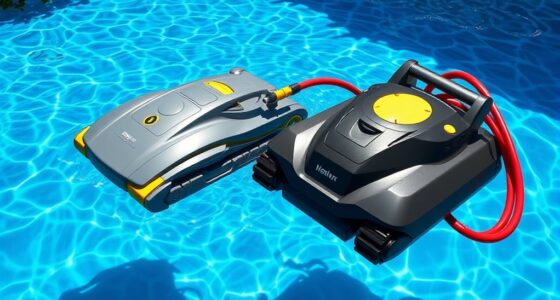To keep your pool pristine year-round, regularly test and balance water chemistry, including pH, alkalinity, and sanitizer levels. Inspect equipment like pumps, filters, and skimmer baskets, cleaning them as needed, and fix any leaks or damage promptly. Maintain proper water circulation by brushing walls and vacuuming the bottom, while ensuring filters work efficiently. Consistent upkeep prevents problems and extends your pool’s life—continue below to discover essential tips for flawless pool maintenance.
Key Takeaways
- Regularly test and adjust water chemistry, including pH, alkalinity, and sanitizer levels, to maintain balanced water.
- Inspect and clean pool equipment such as filters, skimmers, and pumps to ensure optimal performance.
- Brush walls, vacuum the bottom, and skim surface debris weekly to keep water clear and free of algae.
- Conduct routine maintenance on hoses, valves, and electrical components to prevent leaks and mechanical failures.
- Perform seasonal checks and adjustments to prepare the pool for different weather conditions and long-term use.

Are you prepared to keep your pool sparkling and ready for swim season? Proper maintenance starts with making certain your pool’s chemical balance and conducting regular equipment inspections. Maintaining the right chemical levels is essential for clear, safe water and to prevent algae growth or bacteria buildup. Test your water regularly using a reliable test kit, aiming for ideal pH levels between 7.2 and 7.6. Keep alkalinity in check, ideally between 80 and 120 ppm, to stabilize pH and prevent fluctuations. Chlorine or other sanitizers should be maintained at appropriate levels—usually 1 to 3 ppm—to ensure bacteria and viruses are eliminated. If your tests show imbalanced chemicals, take immediate action by adding the necessary chemicals, like pH increasers or reducers, to restore equilibrium. Remember, consistent testing and adjustment are key to preventing costly problems down the line.
Equally important is conducting routine equipment inspection to keep everything functioning smoothly. Regularly check your pump, filter, and skimmer baskets for debris or signs of wear. Clear skimmer baskets allow proper water circulation and filtration, which are crucial for maintaining water clarity and chemical efficiency. Inspect your pump and filter system for leaks, strange noises, or reduced flow rates, as these could indicate mechanical issues needing repair. Clean the filter regularly—whether it’s a cartridge, sand, or DE filter—to prevent clogging and ensure maximum filtration efficiency. Keep an eye on hoses, valves, and other components for cracks or damage, and replace worn parts promptly to avoid system failure. Proper equipment inspection not only prolongs the lifespan of your pool equipment but also helps keep your water clean and chemically balanced. Additionally, understanding the importance of contrast ratio can help you select the right pool lighting for evening swims, ensuring optimal visibility and ambiance.
Alongside chemical and equipment checks, don’t forget other essential tasks like skimming debris from the surface, brushing the pool walls, and vacuuming the bottom. These chores prevent dirt and algae from settling and becoming harder to remove. Regularly testing and adjusting your chemical balance, combined with diligent equipment inspection, forms the foundation of effective pool maintenance. It might seem like routine work, but these small efforts greatly impact your pool’s longevity and your overall swimming experience. When you stay on top of these tasks, you’ll enjoy pristine water all season long, free of cloudy water or unwanted contaminants. By making these practices part of your weekly routine, you’ll save time and money, reduce chemical use, and ensure your pool remains a safe and inviting retreat for family and friends. Proper care today guarantees a beautiful, trouble-free pool tomorrow.
Frequently Asked Questions
How Often Should I Replace My Pool Filter?
You should replace your pool filter based on its type and your maintenance schedule. Generally, cartridge filters need replacement every 1-2 years, while sand filters can last 3-5 years with proper maintenance. Regular filter cleaning is essential, but don’t forget to follow your filter’s specific maintenance schedule. Keep an eye on water clarity and pressure gauges to determine when filter replacement is necessary for maximum pool health.
What’S the Best Way to Remove Algae?
To remove algae, act quickly and thoroughly. Brush the pool walls and floor to loosen algae, then use a pool algaecide or chemical alternatives like chlorine shock to kill it. Regular algae prevention, such as maintaining proper pH levels and filtration, helps stop algae from forming. Keep your pool clean and balanced, and you’ll prevent future algae growth, ensuring a crystal-clear, inviting pool all season long.
Can I Use Household Chemicals for Pool Maintenance?
You might consider household chemicals for pool maintenance, but it’s not recommended for pool safety. Many household products aren’t designed for pools and can cause imbalance or harm. Using them could damage your equipment or create unsafe water conditions. Always stick to pool-specific chemicals and follow safety guidelines to ensure your pool stays clean and safe. Proper maintenance with the right chemicals helps prevent issues and keeps your pool in top shape year-round.
How Do I Prevent Pool Equipment From Freezing?
Think of your pool equipment as a delicate musical instrument, vulnerable to winter’s icy silence. To prevent freezing, follow winterizing tips like draining water from pipes and using antifreeze solutions designed for pools. Cover equipment with insulated blankets and keep the area clear of snow. These steps act as a warm embrace, protecting your investment and ensuring your pool stays in harmony, ready to sing again when summer returns.
What Are Signs of a Failing Pool Pump?
You might notice your pool pump making unusual noises or seeing leaks around the pump area. These are signs of a failing pool pump. Pay attention to strange sounds, like grinding or squealing, which indicate motor issues. Also, watch for visible pump leaks, which can lead to further damage. Regular pump leak detection and listening for abnormal pool pump noise can help you catch problems early and prevent costly repairs.
Conclusion
By sticking to this ultimate pool maintenance checklist, you’ll keep your oasis sparkling and inviting all year long. Think of your pool as a shimmering jewel that needs daily care to stay radiant. With each routine check and cleanup, you’re nurturing a crystal-clear haven where memories flow as smoothly as the water. So plunge in confidently, knowing your diligent efforts turn your backyard into a luxurious retreat—an endless summer of pristine perfection.










